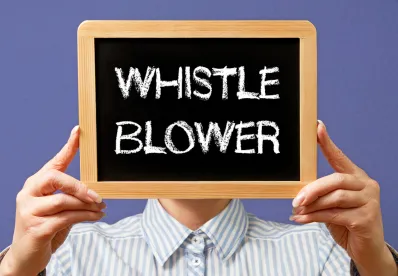The False Claims Act is a commonly misunderstood law, but one that offers powerful protections and financial incentives to those who leverage it to report government fraud.
To help demystify the process for becoming a whistleblower and the benefits of speaking up, whistleblower attorneys and Tycko & Zavareei LLP partners Renée Brooker and Eva Gunasekera answered commonly asked questions about the False Claims Act, government program fraud, and more during a recent office hours webinar. Watch the entire session below.
Understanding the False Claims Act
The False Claims Act is a law that protects taxpayer funds. According to attorney Renée Brooker, “the False Claims Act is very broad, but a defendant is always going to be an entity that is getting government money directly or indirectly.”
Some common areas of enforcement involving the False Claims Act (FCA) involve:
-
Healthcare fraud targeting Medicare, Medicaid, VA, or TRICARE funds
-
Government contract fraud, including those involving the Department of Defense, infrastructure, healthcare, and more
-
Fraud involving government grants and loans
Anytime an entity has received government funds of any kind and commits fraud, they may be held accountable under the False Claims Act. FCA cases are a kind of qui tam law, meaning that an individual can become a relator or a whistleblower by bringing a case on behalf of the government. A relator is eligible to receive up to 30% of the government’s total recoupment in a successful case.
Who Can Be a Whistleblower?
Do you have to be an insider to be a whistleblower? According to Partner Eva Gunasekera, this is a common misconception surrounding the field of qui tam law. Gunasekera continued,
“You do not have to be an insider, but you do have to bring to the government nonpublic information about the fraud. And ideally, it’s nonpublic information that is documented or memorialized in some kind of documentation that the government would otherwise not be privy to. So what I mean is, while anecdotal evidence and witness testimony is key to these types of cases and proving these types of claims, it’s really the documentary evidence that you may have that the government otherwise would not be aware of. That is is the way to really stand your ground as a meritorious relator under the False Claims Act.”
Most Common Whistleblowers
Traditionally, the standard image of a whistleblower is someone who worked at a company that was committing fraud. This “true insider” would best be able to report on the inner workings of the company, and disclose valuable information that would go otherwise overlooked or unreported. Now, however, it is more and more common for there to be non-traditional whistleblowers in the field. Especially in the information era, with faster and more prolific exchange of digital data, there are more non-conventional whistleblowers than ever before.
Some examples of non-traditional relators who may be able to report fraud include the following groups.
Competitors
Someone who is competing for a government contract or funding has more incentive to report fraud. A competing business may share inner knowledge of the workings of the field, and know what prices and quotes are standard. They may have access to non-public information given their customer relations or other connections. Reporting a competitor for defrauding the government is not only ethical; it also makes good business sense. A competitor may be eligible to receive not only the financial award for whistleblowers in a successful case but also the government’s business in the future.
Data Analysis Experts
Data analysis has grown by leaps and bounds given new innovations in the field, and experts may now be able to spot suspicious trends or red flags for fraud simply by analyzing a pool of data. Especially in the health care industry, being able to spot outliers, such as companies that receive large amounts of funding without reporting significant results, is a powerful method for becoming a whistleblower.
Mid to Lower-Level Employees
According to Gunasekera, “You don’t need to be in the C-suite in order to attach False Claims Act liability to a Fortune 500 company. In fact, some of the biggest pharmaceutical settlements under the False Claims Act in the last 30 years were brought by boots-on-the ground sales representatives in those companies who had knowledge of illegal practices like kickbacks that were being provided to physicians, with the expectation of inducing those physicians to write false claims and cause false claims to be submitted to the Medicare program.”
Why Do Whistleblowers File Lawsuits?
There are several reasons why individuals file whistleblower lawsuits. Under the False Claims Act, a relator in a qui tam case is eligible for anywhere from 15-30% of the government’s total recoupment in a successful case. However, while the financial incentive is a powerful motivator, it is far from the only reason. Some common motivations include:
-
Concerns about liability: If your workplace is committing fraud, you may be worried about being implicated. Oftentimes whistleblowers speak up to avoid being caught up in wrongdoing and to ensure their reputations are protected.
-
Fear of retaliation: Whistleblowers are protected against a broad array of retaliatory actions. Some prohibited kinds of discrimination include demotion, suspension, marginalization, harassment, and constructive discharge (feeling forced to quit). If you feel threatened that you may be fired or retaliated against because of workplace wrongdoing, speaking to an attorney can help give you a degree of protection.
-
Doing the right thing: According to Brooker, “Most of our whistleblowers say to us, I know there’s a reward involved, but I’m really not here just for that. I am very concerned and I want to do the right thing.” Whistleblowers are often put in a difficult spot by management and feel pressured to engage in activities that they know are wrong. Reporting the fraud can help put a stop to it and ensure that the stolen funds are returned to taxpayers.
-
Improving the profession: Oftentimes competitors become whistleblowers not only for their financial interest in the matter but also to root out corruption in their entire industry to ensure fair competition. Most people do not want their career to be associated with fraud and scams, especially in fields that help vulnerable people such as healthcare. Some whistleblowers want to level the playing field in their industry and ensure that companies who play by the rules have the same opportunities for success.





 />i
/>i

